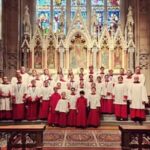“Everyone then who hears these words of mine and does them will be like a wise man who built his house on the rock. And the rain fell, and the floods came, and the winds blew and beat on that house, but it did not fall, because it had been founded on the rock. And everyone who hears these words of mine and does not do them will be like a foolish man who built his house on the sand. And the rain fell, and the floods came, and the winds blew and beat against that house, and it fell, and great was the fall of it.” And when Jesus finished these sayings, the crowds were astonished at his teaching, for he was teaching them as one who had authority, and not as their scribes.
My friend Alan once appeared on a TV show. Rather unusually, the interview took place from Alan’s deck chair, on a deserted stretch of Norfolk beach, on the coast of eastern England. As he reclined facing the waves, Alan told the story of his house, which fell into the sea on that exact spot.
This turn of events did not come as a major surprise to Alan, since coastal erosion has been a steady feature of life in East Anglia for centuries. Its potency is determined by various factors, including the power of waves, the angle of beach, and the composition of sea-facing rock. Up and down the entire coastline, houses and livelihoods have fallen victim to the North Sea. Perhaps the most dramatic example is Dunwich, former capital of the wool trade. At its height, in the 14th century, it was a port similar in size to medieval London. Its decline began in 1286 with a huge coastal storm surge, which set off a pattern of erosion across the centuries. Hundreds of houses were eventually swept into the sea, and eight churches found their final resting place at the bottom of the ocean. Today the population of the village of Dunwich is just 84. It is said that if you listen carefully, you can still hear the sound of church bells from under the waves.
Clearly, location is important. Jesus understands this, and sets out to persuade his listeners. The wise man builds on the rock, the foolish on the sand. Floods are inevitable, their impact sudden and cataclysmic. To a first century Jewish Christian, this would have been a direct reference to the coming day of Judgment, which was expected to appear rapidly and dramatically.
Twenty centuries later, contemporary Christian thought has largely abandoned notions of a sudden last Judgment, and we are left with the challenge of making sense of this story in the light of our own experience. The human condition can seem a lot more predictable to us, a perception bolstered by breakthroughs in technology and medicine. However, in spite of all these advances, houses are still falling off the coast of Norfolk into the sea. And, as a chorister recently remarked, “Life is just a short break from death”.
Our increasing ability to prolong existence also brings unique opportunities, for good and ill. Often these come through seemingly innocuous choices. It’s only once they’re placed side by side, in a vast procession of incremental steps, that we see the kind of character we’ve become. C.S. Lewis refers to the danger of this situation in The Screwtape Letters: “Indeed the safest road to Hell is the gradual one – the gentle slope, soft underfoot, without sudden turnings, without milestones, without signposts.” No drama here, just everyday humdrum decisions leading a person through the intricate maze of his or her own creating. The ultimate goal of the devils in Lewis’s story is to bury all believers with those eight churches at the bottom of the sea, without them ever really noticing it.
We need to pay attention, then, using Lent as a time for reflection, for checking the location of the heart, and for assessing the kind of ground we’re standing on. If we discover sand between our toes, we need to listen again to the words of Jesus, and do them. For only through Jesus are we are promised the hope of perfect unity, far, far away from the coast of Norfolk, “upon another shore and in a greater light, with that multitude which no man can number, whose hope was in the Word made flesh, and with whom we for evermore are one.”
Lent 2014


